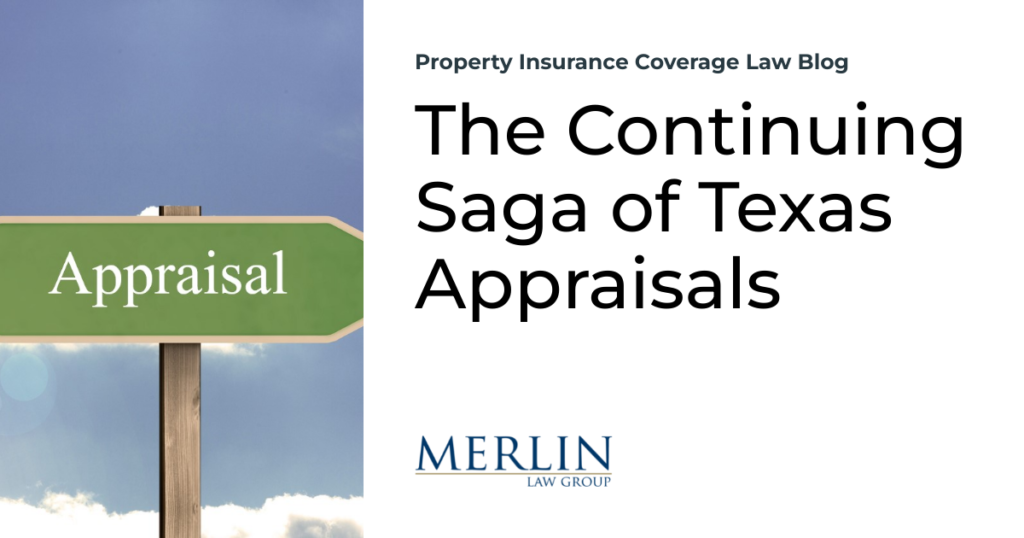The Continuing Saga of Texas Appraisals

When we last debated in Houston, Steve Badger could hardly wait to share a new case with the Insurance Appraisal and Umpire (IAUA) audience.1 With me paraphrasing, this is my recollection of what Badger said about the case:
The main issue addressed by this case is: Does the standard appraisal award form language resolve disputes as to the extent/cause of damage and/or date of loss?
This case holds it does not.
…This opinion confirms the right to litigate the extent and cause of damage as well as date of loss issues when an award uses just the standard boilerplate appraisal award form language.
I always advocate for clarity in our appraisal awards, so we know what the panel considered, whether the award is final, and whether we still have a right to litigate certain issues. Ambiguity is not good for anyone. Whenever we have issues concerning the existence, extent of damage, or date of loss, insurers should make sure there is a paper trail in the appraisal process showing our efforts to bring clarity to what the panel is considering. This should be by either using an appraisal protocol or by providing suggested appraisal award language. At a minimum, the insurance company appraiser should raise these issues with the appraisal panel.
So, what did the judge actually say? The judge noted these facts:
The appraisers submitted their award and schedules detailing the expenses and the total appraisal amount. The documents identify the ‘Date of Loss’ as April 15, 2021, and identify the ‘Type of Loss’ as ‘hail and wind damage.’ The award itself provided $21,784.01 as the amount of loss, reflecting a replacement cost of $30,738.15, less $8,954.14 in depreciation. The award does not contain any statement from the appraisers that, for example, they only evaluated damage that occurred on or about April 15, 2021, or that the appraisal amount reflects any apportionment between uncovered and covered losses. Below the appraisers’ signatures, the award states:
This award is made without consideration of any deductibles or prior payments. Such deductibles and prior payments will be subtracted from any payments due and owing as a result of the entry of this award. This award is made subject to all the terms, conditions, and exclusions of the policy which may be the subject of this appraisal.
….
The appraisers here made no effort to determine whether the loss occurred during the coverage period, and they did not state that Hoff’s policy covered the claimed loss.
… The appraisers in this case did not find the date when the damage occurred. While the supporting materials to the award indicate that the appraisers considered April 15, 2021, as the date of loss, nothing in the award suggests that the appraisers segregated any damage from the total appraisal amount because that damage occurred on a different date. The award did state the roof’s replacement cost, less depreciation, but did not separate what damage was covered from what was not based on the date of loss.
So, the judge denied the policyholder’s motion for summary judgment, stating:
The court agrees with Meridian that the award does not establish liability for a covered loss under the policy.
Steve Badger is correct that the award form did not satisfy the court in this case and with these facts. We can learn from and be mindful of these unique case facts. Still, many appraisal panels in states other than Texas make valid awards that determine the amount of hail and wind damage using this form.
My suggestion is to list the perils of damage and the date of the damage so that there is no confusion when making an appraisal award form. Further, I would make certain that if the panel is in Texas, the award should state that the appraisers “only evaluated damage that occurred on or about” a certain date and that the appraisal amount reflects apportionment between alleged uncovered damage and covered losses caused by the covered perils. In this manner, Texas policyholders may finally get paid and avoid even more claims payment delays.
Thought For Day
The quality of our lives depends not on whether or not we have conflicts, but on how we respond to them.
—Thomas Crum
1 Hoff v. Meridian Security Ins. Co., No. H-23-00041, 2023 WL 5192013 (S.D. Tex. Aug. 11, 2023).







